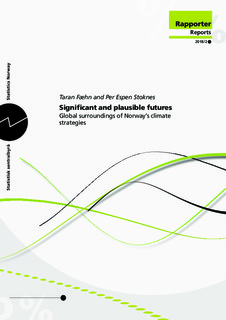Significant and plausible futures. Global surroundings of Norway’s climate strategies
| dc.contributor.author | Fæhn, Taran | |
| dc.contributor.author | Stoknes, Per Espen | |
| dc.date.accessioned | 2018-02-27T10:24:33Z | |
| dc.date.available | 2018-02-27T10:24:33Z | |
| dc.date.issued | 2018-01-17 | |
| dc.identifier.isbn | 978-82-537-9669-7 | |
| dc.identifier.issn | 0806-2056 | |
| dc.identifier.uri | http://hdl.handle.net/11250/2487313 | |
| dc.description.abstract | This report describes the approach and results of a scenario workshop for a transdisciplinary team of 18 experts held in the project SMART PATHS in June 2017. The purpose was to span out a handful of alternative qualitative scenarios for the forthcoming global development. The specified question that the scenarios set out to shed light on is: what future external drivers are particularly decisive for the design and performance of national climate strategies in the period of 2020-2050? The work resulted in four, internally consistent, qualitative narratives of the global social, economic, technological, and political future and, in particular, of what they would mean for the external surroundings of the small, open Norwegian economy and its climate strategy Ahead. | nb_NO |
| dc.language.iso | eng | nb_NO |
| dc.publisher | Statistisk sentralbyrå | nb_NO |
| dc.relation.ispartofseries | Rapporter;2018/02 | |
| dc.subject | Forurensning | nb_NO |
| dc.subject | Klimatiltak | nb_NO |
| dc.title | Significant and plausible futures. Global surroundings of Norway’s climate strategies | nb_NO |
| dc.type | Research report | nb_NO |
| dc.subject.nsi | VDP::Landbruks- og Fiskerifag: 900::Landbruksfag: 910::Naturressursforvaltning: 914 | nb_NO |
| dc.source.pagenumber | 50 s. | nb_NO |
Tilhørende fil(er)
Denne innførselen finnes i følgende samling(er)
-
Rapporter / Reports (SSB) [1689]
